Torby is originated from United States but Turkish Angora is originated from Turkey. Both Torby and Turkish Angora are having almost same weight. Both Torby and Turkish Angora has same life span. Both Torby and Turkish Angora has same litter size. Both Torby and Turkish Angora requires Moderate Maintenance.
Basic Information
undefined
United States
Turkey
Life Span:
10 - 18 Years
15 - 18 Years
Colors Available:
Patches of red, cream, grey
Mainly white, but other colors too
Coat:
Short- or long haired
Long haired, single coat
Shedding:
Moderate
Moderate
Temperament:
Affectionate, Alert, Cheerful, Curious, Energetic, Friendly, Gentle, Independent, Intelligent, Lively, Loving, Loyal, Outgoing, Playful, Quiet, Responsive, Social, Stubborn, Sweet, Territorial
Affectionate, Alert, Cheerful, Energetic, Friendly, Independent, Intelligent, Lively, Loving, Loyal, Outgoing, Playful, Protective, Responsive, Social, Sweet, Territorial
Grooming:
Moderate Maintenance
Moderate Maintenance
New Owners Friendly:
Yes
Yes
History
The Torby is a rare cat and the name ‘Torbie’ is shortened for Tortoiseshell-tabby. They are known for their tri-colored coats. In fact, when a cat has tabby stripes along with Tortoiseshell markings, the results are Torbie.
Tortoiseshell cats are almost exclusively female. Males do exist but they are rare. They’re also referred to as Torties with their coat resembling that of the shell of a tortoise.
The colors represented are usually red, orange and black.
Just like the Tabby cat, the Tortie cat is not actually a breed, but is rather referring to the coat pattern. Pure breed cats such as the Maine Coon can also have a Tortoiseshell pattern.
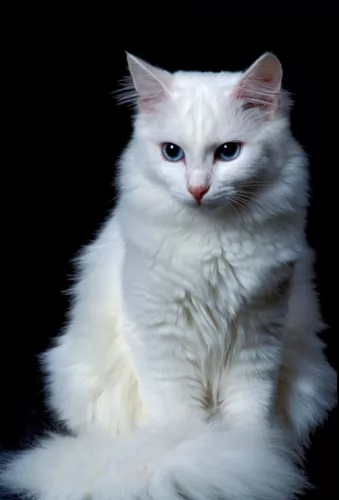 The Turkish Angora is a very old breed that naturally developed. It is thought that the breed developed in Turkey in the Ankara region formerly known as Angora.
The Turkish Angora is a very old breed that naturally developed. It is thought that the breed developed in Turkey in the Ankara region formerly known as Angora.
There are records that indicate that the Turkish Angora made an appearance in the UK as early as the 14th century already. Also, the beautiful longhaired cat was also introduced to the United States.
A breeding program was started for these cats in the early 20th century and it was then taken to Canada in 1963 and accepted as a championship breed.
While white was the only acceptable color at first, they now come in many different colors.
Description
There is a type of tortie cat that is called a torbie and it comes with tabby-like features. They are striking looking cats and can be medium to large size, weigh between 3 and 7kg and be muscular and athletic.
Essentially when there are tabby stripes you get a Torbie. Some people call them patched tabbies because they are a tabby with
Temperament:
No two Tortoiseshell cats have the same personalities, and because they can be any breed of cat, they have a wide range of personality characteristics.
They can be energetic, docile, curious, lazy, playful, shy, reserved, aloof, social, friendly, angry, calm, or something else. Not every Torbie cat will have the same characteristics, but most make the most awesome pets.
It is true that a cat’s personality and behavior are formed a lot by the people who own it and the lifestyle they provide for it.
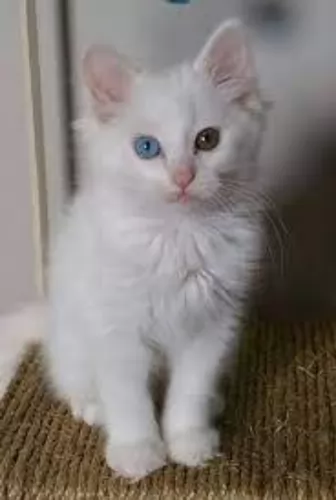 This is a medium-sized, muscular cat that can weigh between 3 and 6kg. It is a long-haired cat and the single coat has no undercoat.
This is a medium-sized, muscular cat that can weigh between 3 and 6kg. It is a long-haired cat and the single coat has no undercoat.
While the Turkish Angora is essentially white, its coat can come in a number of other colors.
The cat’s body if firm and fairly long, the legs are long with the hind legs being longer than the front legs, The tail is long and plumed, the head has large fairly pointed ears that can have tufts of fur. The eyes are large and almond-shaped and slant somewhat upwards. The color of the eyes can be blue, green, gold, amber.
The cat has an alert, intelligent look to him.
Temperament:
This is a very active, athletic cat and he likes nothing more than to leap up on to high perches to survey his surroundings. They are intelligent, affectionate cats and they seem to gravitate towards one special human family member.
The cat is also protective of his human family. If any family member wants to stroke and pet them, they are absolutely delighted, just lapping up the attention.
They are smart enough to learn a few tricks too. They aren’t vocal cats but are sweet and quiet as well as being affectionate, making them perfect companions.
They don’t do well with changes, and a sudden change in his lifestyle can be upsetting for him.
Characteristics
Your torbie cat isn't going to turn out the same way as your friend's torbie cat. This is because torbie is just indicating the type of coat your cat has. Yes, they can be strong-willed, social and even angry sometimes, but they can also be quiet, sweet and content. Nothing is set in stone when it comes to a cat's personality.
The type of personality you have and the lifestyle you provide your cat with can play a big part in how your Torby turns out. Give him lots of love and care and you'll be blessed with an awesome friend and pet.
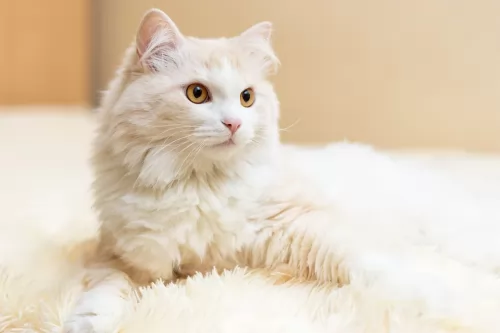 Beautiful to look at, this cat has got all the characteristics that make him a wonderful pet. He is playful well into adulthood and will love an assortment of stimulating toys to be amused by.
Beautiful to look at, this cat has got all the characteristics that make him a wonderful pet. He is playful well into adulthood and will love an assortment of stimulating toys to be amused by.
He is a sociable breed and doesn’t enjoy being left alone for hours. It would be far better to have another feline friend to keep him company.
Active and entertaining, you’ll be amused by your Turkish Angora and be so glad that you made the decision to bring such a charming creature into your home and heart.
Health Problems
Torbie cats are such lovable felines and because they are describing the type of coat the coat has and not the breed, nobody can be sure how long these cats will live for.
Some will only live to be 10 while others can reach 15 to 18 years of age. The diet and lifestyle you give your torbie can influence his health and longevity.
Health issues in a torbie are certainly not connected to the color of the coat. No matter what cat breed you have, most of the common cat illnesses to watch for are issues that affect the kidneys, the eyes, the skin, and heart.
Make sure you get your torbie vaccinated against some of the deadly cat diseases there are.
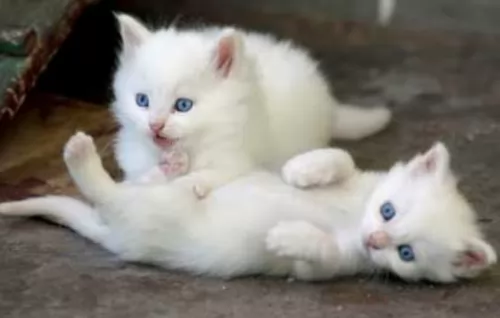 Turkish Angoras are generally healthy, but white cats with blue eyes can be prone to deafness. It is the W gene that is responsible for the white coat and blue eyes. Unfortunately, the presence of a blue eye can indicate deafness in the cat. But there are these cats that have 2 blue eyes and they have normal hearing.
Turkish Angoras are generally healthy, but white cats with blue eyes can be prone to deafness. It is the W gene that is responsible for the white coat and blue eyes. Unfortunately, the presence of a blue eye can indicate deafness in the cat. But there are these cats that have 2 blue eyes and they have normal hearing.
Another problem that has been seen in this beautiful cat breed is Ataxia which is a deadly neuromuscular disorder.
The most common sign of ataxia is an abnormal way of walking and the cat is actually unsteady on his feet. Sometimes the feet can even drag on the ground. Thankfully, screening has reduced the incidence of the disease.
Also, watch out for hypertrophic cardiomyopathy, a kind of heart disease that causes the heart muscle to enlarge.
Just remember that with a cat, diet can also play a huge role in the health of a cat. Your furry friend needs the right meaty foods with the right balance of nutrients to remain healthy and strong.
Caring The Pet
It can be difficult to decide which food to go with for your feline friend as the cat food manufacturers have provided pet lovers with a generous selection.
With a cat, it may be tempting to choose the cheapest option, but in the long run, it will just increase your vet bills. Diet plays a massive role in the health of your cat. The important thing to remember is that your cat is a carnivore and he will require meat as the biggest part of his diet. If in doubt, speak to your vet about the type of food to give your cat and how much.
Ensure your cat has a constant supply of fresh, cool water.
All cats are low-maintenance, and your Torby isn’t going to require much grooming. Make a habit of regular grooming, even if it is only once a week. Your Torby will also need his claws trimmed regularly. You can visit your vet or pet groomer to do this for you.
Just like human parents prepare for the arrival of a new baby, you have to prepare for the arrival of a cat in the home, whether it comes to you as a kitten or an adult.
Make a list of the essential cat accessories you will need.
Buy some fun toys for your Torby, more so if you are bringing a kitten home. Cats need to be stimulated to steer away from boredom.
Essentially your Torby checklist will look like this -
• Litter box and cat litter
• Cat bedding
• Veterinarian-recommended cat food
• Bowls for food and water
• Toys
• Collar with tag and contact info etched in
• Brush for grooming
• Scratching post
• Climbing tree
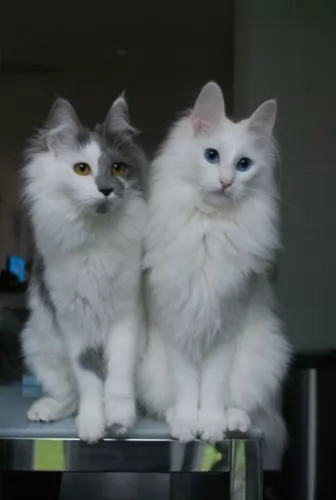 The Turkish Angora has a single coat and the lack of an undercoat makes it easy to brush him and keep the coat soft and silky. Also, the coat is only fully developed when the cat is about 2 years old.
The Turkish Angora has a single coat and the lack of an undercoat makes it easy to brush him and keep the coat soft and silky. Also, the coat is only fully developed when the cat is about 2 years old.
Check the inside of the ears. You may not want to clean them out yourself as you have to be very careful not to damage the ears. The vet and cat groomers can help you with this.
Keep your Turkish Angora’s litter box spotlessly clean. Cats are very particular about the cleanliness of their litter box and the feces will need to be removed every single day.
Comparison with other breeds
- Torby vs Abyssinian - Breed Comparison
- Torby vs Aegean - Breed Comparison
- Torby vs African Serval - Breed Comparison
- Torby vs Chausie - Breed Comparison
- Torby vs American Bobtail - Breed Comparison
- Torby vs American Curl - Breed Comparison
- Torby vs American Keuda - Breed Comparison
- Torby vs American Longhair - Breed Comparison
- Torby vs American Polydactyl - Breed Comparison
- Torby vs American Shorthair - Breed Comparison
- Torby vs American Wirehair - Breed Comparison
- Torby vs Applehead Siamese - Breed Comparison
- Torby vs Ashera - Breed Comparison
- Torby vs Asian - Breed Comparison
- Torby vs Asian Semi-Longhair - Breed Comparison
- Torby vs Australian Mist - Breed Comparison
- Torby vs Balinese - Breed Comparison
- Torby vs Bengal - Breed Comparison
- Torby vs Bicolor - Breed Comparison
- Torby vs Birman - Breed Comparison
- Torby vs Blue Russian - Breed Comparison
- Torby vs Bombay - Breed Comparison
- Torby vs Brazilian Shorthair - Breed Comparison
- Torby vs Bristol - Breed Comparison
- Torby vs British Longhair - Breed Comparison
- Turkish Angora vs Abyssinian - Breed Comparison
- Turkish Angora vs Aegean - Breed Comparison
- Turkish Angora vs African Serval - Breed Comparison
- Turkish Angora vs Chausie - Breed Comparison
- Turkish Angora vs American Bobtail - Breed Comparison
- Turkish Angora vs American Curl - Breed Comparison
- Turkish Angora vs American Keuda - Breed Comparison
- Turkish Angora vs American Longhair - Breed Comparison
- Turkish Angora vs American Polydactyl - Breed Comparison
- Turkish Angora vs American Shorthair - Breed Comparison
- Turkish Angora vs American Wirehair - Breed Comparison
- Turkish Angora vs Applehead Siamese - Breed Comparison
- Turkish Angora vs Ashera - Breed Comparison
- Turkish Angora vs Asian - Breed Comparison
- Turkish Angora vs Asian Semi-Longhair - Breed Comparison
- Turkish Angora vs Australian Mist - Breed Comparison
- Turkish Angora vs Balinese - Breed Comparison
- Turkish Angora vs Bengal - Breed Comparison
- Turkish Angora vs Bicolor - Breed Comparison
- Turkish Angora vs Birman - Breed Comparison
- Turkish Angora vs Blue Russian - Breed Comparison
- Turkish Angora vs Bombay - Breed Comparison
- Turkish Angora vs Brazilian Shorthair - Breed Comparison
- Turkish Angora vs Bristol - Breed Comparison
- Turkish Angora vs British Longhair - Breed Comparison
 Petzlover
Petzlover The Turkish Angora is a very old breed that naturally developed. It is thought that the breed developed in Turkey in the Ankara region formerly known as Angora.
The Turkish Angora is a very old breed that naturally developed. It is thought that the breed developed in Turkey in the Ankara region formerly known as Angora. This is a medium-sized, muscular cat that can weigh between 3 and 6kg. It is a long-haired cat and the single coat has no undercoat.
This is a medium-sized, muscular cat that can weigh between 3 and 6kg. It is a long-haired cat and the single coat has no undercoat. Beautiful to look at, this cat has got all the characteristics that make him a wonderful pet. He is playful well into adulthood and will love an assortment of stimulating toys to be amused by.
Beautiful to look at, this cat has got all the characteristics that make him a wonderful pet. He is playful well into adulthood and will love an assortment of stimulating toys to be amused by. Turkish Angoras are generally healthy, but white cats with blue eyes can be prone to deafness. It is the W gene that is responsible for the white coat and blue eyes. Unfortunately, the presence of a blue eye can indicate deafness in the cat. But there are these cats that have 2 blue eyes and they have normal hearing.
Turkish Angoras are generally healthy, but white cats with blue eyes can be prone to deafness. It is the W gene that is responsible for the white coat and blue eyes. Unfortunately, the presence of a blue eye can indicate deafness in the cat. But there are these cats that have 2 blue eyes and they have normal hearing. The Turkish Angora has a single coat and the lack of an undercoat makes it easy to brush him and keep the coat soft and silky. Also, the coat is only fully developed when the cat is about 2 years old.
The Turkish Angora has a single coat and the lack of an undercoat makes it easy to brush him and keep the coat soft and silky. Also, the coat is only fully developed when the cat is about 2 years old.